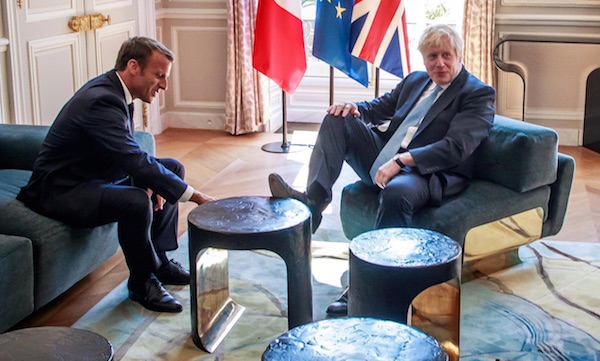
The French President Emmanuel Macron has said Irish reunification and integration of the entire island in the EU “would solve all the problems” of Brexit, “but it is not up to France”.
He and British Prime Minister Boris Johnson and other EU leaders have agreed to work through September for an agreement between the EU and Britain on a negotiated Brexit.
However, Johnson is still insisting that the previously agreed ‘backstop’ to prevent Britain’s border through Ireland from becoming remilitarised must be removed, despite the insistence of Irish and EU negotiators that it must remain.
Following his meetings with Mr Macron and German chancellor Angela Merkel this week, the EU have said they will listen to proposals to change the withdrawal agreement by inserting “alternative arrangements” to the backstop in the coming weeks.
Johnson’s Brexit is set to take the north of Ireland out of the EU against its will in an action that largely nullifies the 1998 Good Friday peace Agreement.
Mr Macron today insisted any accord on Britain’s departure from the EU must guarantee the stability of Ireland. He stressed the legacy of the conflict in the Six Counties and the need to protect the peace there.
Mr Macron said: “The key elements of the withdrawal agreement and the Irish backstop are not just technical constraints or legal quibbling. They are genuine, indispensable guarantees to preserve stability in Ireland and the integrity of the single market, which is the basis of the EU.”
In an earlier meeting with journalists, Mr Macron implied that Mr Johnson did not take seriously enough the risk of reviving the conflict in Ireland.
“There are still families whose children, brothers and sisters died in this conflict,” the French president said. “To think of reviving that, because it suits us, would be irresponsible. I consider that Irish peace is European peace. We must not allow it to be threatened by a political and institutional crisis in Britain.”
Mr Macron also said Irish reunification and integration of the entire island in the EU “would solve all the problems, but it is not up to France”.
Chancellor Merkel said Germany accepted Britain’s wish to depart the EU on October 31st “as a fact” but insisted other facts could not be ignored either.
“The Good Friday [Belfast] Agreement needs to be respected in letter and spirit by Britain and... the Republic of Ireland, which will continue to remain a member [of the EU],” she said. “This is part and parcel of our European position.”
In Dublin, a government spokeswoman noted the “very strong solidarity from our European colleagues on the need for the backstop”. The spokeswoman said Dublin would “await seeing detailed proposals from the UK which, if agreed, would mean that the backstop would not have to come into force”.
Sinn Féin’s Michelle O’Neill protested that the British government “continues to purposely ignore the cross-community majority of citizens in the North of Ireland and elected Assembly members” who voted to oppose “this unwanted Brexit” during the referendum in 2016.
More than half of the members of the Belfast Assembly this week signed a letter to the EU Council President Donald Tusk expressing their continuing support for the Brexit backstop.
In polls, a clear majority of voters in the Six Counties continue to back remaining in the EU. In the event of Brexit, they have said they would prefer new checks to take place at ports and airports rather than at the border.
Ms O’Neill said that Johnson’s government are “playing fast and loose with the Good Friday Agreement” in their pursuit of a reckless no-deal Brexit, which will lead to a hard border on the island of Ireland.
“They have shown no regard for the majority of the people of the north who voted to remain in the EU,” Ms O’Neill. “Their crash-out Brexit plan will put our economy and the gains made in the peace process at risk.
“The best way to protect the livelihoods, the economy and the peace process is to implement the Withdrawal Agreement and the backstop.
“The backstop is supported by our businesses, our agri-food producers and manufacturers, our community sector and by the majority of our political parties. It is an insurance policy which should remain in place unless and until an alternative is found.”
![[Irish Republican News]](https://republican-news.org/graphics/title_gifs/rn.gif)
![[Irish Republican News]](https://republican-news.org/graphics/title_gifs/harp.gif)

